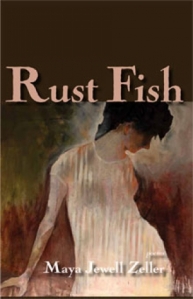
Fans of the Scrapper Poet know that I love coming-of-age poetry books, so I’m happy to add Rust Fish by Maya Jewell Zeller to my collection. Zeller’s debut book tells the story of a girl growing up in the working-class world of the Pacific Northwest. Using narrative poems that often invoke a strong sense of place, Zeller recounts the uncertainty and brutal life of children, while balancing resilience and hope in her stories.
Rust Fish is divided into four parts, each part beginning with a poem titled “Rust Fish.” The poems, obviously contain images of fish, a symbol may seem somewhat expected in literature of the Pacific Northwest. Indeed, many of us when we think of this part of the country get the instant mental image of salmon struggling against the current to return to their streams to spawn. Still, the fish found in Zeller’s collection do the unexpected — they are metal decorations that break free at night, fish that long for the moon to bleach them beautiful, or beautiful creatures that can take you to heaven in their gills. Each poem acts as a preface to the section it proceeds, as the reader is guided through the life of a girl who lives a rough and tumble life.
From the start, we see a strong and tough heroine, and often Zeller’s poems explore gender roles and battles, often relaying violence and heartache. In “Sibling Rivalry” a child gets revenge on her brother who drills a hole in her Skipper doll: “When I was done/I mutilated Joe/the way a boy tortures beetles/or dismantles toy girls.” In another poem, a quiet observer watches a neighbor boy lash live crickets to the railroad tracks: “their bodies immobile/and bound in blue fishing line/eyes like tiny moons orbiting a lost planet.” In yet another poem, “Cousins” the speaker steps away from the mayhem and ponders her role as a girl: “I’ve already had a bath, but the skin/on my soles was creased/from summer running, the callus/of being seven. So Heather/bought a bottle of nail/polish to her room, put me/on the edge of the bed.” Watching her cousin paint her toenails, the narrator believes she is “the most gorgeous girl I had ever seen.”
Class struggles also abound in this collection, especially shown in such poems as “Saturday Shopping” where the young narrator renames the colors of the clothes in the thrift shop where “black was outhouse hole/or old tire” and “reds ranged/from dictionary cover to hot pepper.” Certainly, the physical landscape, whether its manmade or natural, tells many stories of this hardscrabble life. In the poem, “In the Season of Rivers” the narrator explains that “We learned to drive on mud/slick roads” in a world where “some floods/brought cows across the fields.” In another poem, “The Summer Sky and I Made a Game of Collecting Trespasses” the narrator recounts adventures in dangerous and desolate places questioning, “How many times/did we think about torching/that old barn down, or the unlocked house/strewn with rain-soaked porn.”
Organized in a chronological format, readers follow this young girl as she grows up learning lessons and dreaming what would seem to be impossible dreams, all the while struggling to find a place in this world. In “Goddammit” she explains that they all “learned to swear from our fathers/when they’re chopping wood/and miss the log.” In “She Dreams of Being an Artists” the narrator sees beauty in her breath against the frost on a windowpane.” Certainly, in later poems, the narrator sees a bit of herself in the children in her neighborhood and in her students. Indeed, in “Neighborhood Kids,” the narrator is pleased when some little boys want the tomatoes from her garden until she learns, at the end of the poem, that they aren’t eating them, but using them as balls and hitting them with their baseball bats.
Rust Fish is a delightful exploration of how sense of place intertwines with story and how we are part of the physical landscape around us. Rugged and beautiful, Zeller’s poetry is not to be missed — for more information, see the poet’s website here.


